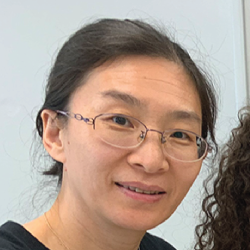Members
PREPARE is a global network of passionate members who drive forward the scientific and public health advances necessary to ready us for the next pandemic. Join us to grow your network, find and share upcoming events, and participate in our workshops!
Enter keywords to search the member names or info cards:
Wandi Ding

- Professor of Mathematical Sciences
Dr. Ding is a professor and an M.S. Graduate Program advisor in the Department of Mathematical Sciences at Middle Tennessee State University. She serves as faculty for the Interdisciplinary Ph.D. in Computational and Data Science Program, as well as the Honors College. She is an active learner and user of SIMIODE (Systemic Initiative for Modeling Investigations and Opportunities with Differential Equations), which is a Community of Practice dedicated to using modeling to teach differential equations, and she serves as Board of Contributing Advisors for SIMIODE (2017 – current). She works together with Dr. Judith Iriarte-Gross to serve as co-president for the Association for Women in Science (AWIS) Tennessee Chapter (2021-current).
Dr. Ding's research interests include mathematical biology, optimal control, computational biology, mathematical modeling, ordinary and partial differential equations, difference equations, agent/individual-based modeling, and hybrid systems with applications to population dynamics, disease modeling, and control; natural resource management; and systems biology. She is also interested in deep learning and quantum biology and improving undergraduate STEM education through research experiences. Dr. Ding's research focuses on understanding the spatial and temporal patterns that arise in dynamic biological systems and, when possible, finding the best way to control the system.
Epidemiology and Public Health, Infodemiology, Social Networks, and Scientific Communication, Education, Training, and Workforce Development, Computational Biology and Bioinformatics
Spencer Dugbartey

- Molecular Technologist
Epidemiology and Public Health
Dominique Duncan

- Assistant Professor of Neurology
Dr. Dominique Duncan is an assistant professor of Neurology at the USC Stevens Neuroimaging and Informatics Institute in the Laboratory of Neuro Imaging (LONI) with joint appointments in Neuroscience and Biomedical Engineering. Dr. Duncan’s background spans mathematics, engineering, and neuroscience. She double majored in Mathematics and Polish Literature as an undergraduate at the University of Chicago and minored in Computational Neuroscience. She earned her Ph.D. in Electrical Engineering at Yale University. In her Ph.D. thesis, she analyzed intracranial EEG data using nonlinear factor analysis to identify preseizure states of epilepsy patients. After receiving her Ph.D., she was a professor of Mathematics at Sichuan University in Chengdu, China, for a summer program for undergraduate students. She then took a postdoctoral position in Neurology at the Stanford University School of Medicine, followed by a postdoctoral position in Mathematics at UC Davis, where she developed an algorithm based on diffusion maps to classify Alzheimer’s patients using MRI. She has built international, multidisciplinary collaborations and developed novel analytic tools to analyze multimodal data, including imaging and electrophysiology. Her interests lie at the intersection of data analysis, signal processing, and machine learning, particularly in the areas of traumatic brain injury, epilepsy, and, more recently, COVID-19. By creating large-scale data repositories and linking them with visualization and analytic tools for both neuroimaging and electrophysiology data, as well as multimodal data of COVID-19 patients, she aims to encourage collaboration across multiple fields. Dr. Duncan also uses virtual reality to optimize the process of analyzing neuroimaging data and to improve neuroscience education among K-12 students.
Education, Training, and Workforce Development, Computational Biology and Bioinformatics


